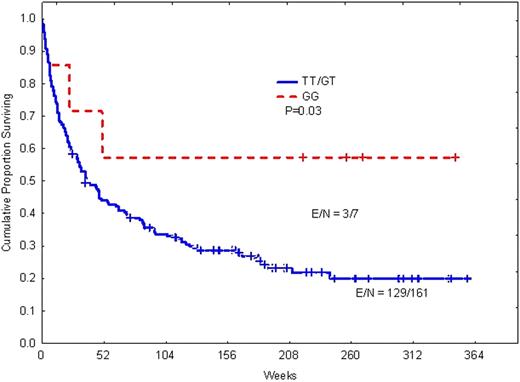Abstract
Abstract 995
Poster Board I-17
Several reports have suggested that mutations in the Wilms tumor 1 gene (WT1) represent an adverse prognostic factor in acute myeloid leukemia (AML). Here we examined the associations of WT1 mutations in exons 7 and 9 and the silent R301 single-nucleotide polymorphism (SNP) in exon 7 (A903G; NCBI dbSNP reference ID: rs16754) with outcome in AML patients treated at a single institution. Peripheral blood plasma and bone marrow samples from 174 newly diagnosed AML patients were tested for WT1 mutations in exons 7 and 9 by sequencing and fragment-length analysis for the detection of small deletions/insertions. Sequencing provided information on the specific genotype of the rs16754 SNP. The findings were correlated with outcome and other laboratory findings. WT1 mutation was detected in 7 of 50 (14%) AML patients <50 years of age and in 5 of 124 (4%) patients >50. The silent R301 SNP was detected at frequencies of 4% for GG, 26% for GA, and 70% for AA genotypes, but there was no difference with age. A similar SNP genotype distribution was detected in normal control subjects. WT1 mutations were associated with higher white cell count (P=0.01) and higher percentage of blasts in bone marrow (P=0.03) and peripheral blood (P=0.009). In addition, WT1 mutation was significantly associated with FLT3 mutation (P=0.002) but not NPM1 mutation (P=0.8). WT1 mutation was also significantly associated with shorter survival (P=0.025), event-free survival (P=0.002), and complete remission duration (P=0.002) in patients <50 years of age, but not in older patients. The association with shorter survival persisted when only patients with intermediate cytogenetics were considered (P=0.03). There was no correlation between WT1 mutation and response to therapy. The most striking correlation was between the presence of the GG genotype at R301 and longer survival, irrespective of age (see survival chart below). There was no difference in survival between the AA and GA groups. To the best of our knowledge, this is the first report describing correlation between survival duration and an SNP in the WT1 gene. While we confirm that the presence of WT1 mutation is associated with poor outcome in young AML patients, our data suggest that there is no clinical value in testing patients older than 50 for WT1 mutation, but that there may be value in testing adult patients of all age groups for the SNP polymorphism at R301
No relevant conflicts of interest to declare.
Author notes
Asterisk with author names denotes non-ASH members.


